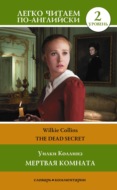Buch lesen: "Клуб самоубийц. Уровень 2 / The Suicide Club"
© А. И. Смирнова, адаптация текста, коммент., упраж. и словарь, 2023
© ООО «Издательство АСТ», 2023
The Suicide Club
Story of the young man with the cream tarts1
During his residence in London, the famous Prince Florizel of Bohemia gained the affection of all classes by his manners and by his generosity. He was a remarkable man even by what was known of him. Although he had an even temper and a philosophy of a ploughman, the Prince of Bohemia also had a taste for the adventurous and eccentric life. Now and then2, when he felt blue, when there was no laughable play in any of the London theatres, and when the season of the year was unsuitable for his favourite sports, he asked his confidant and Master of the Horse3, Colonel Geraldine, to a walk. The Master of the Horse was a young officer of a brave and even hot temper. He was glad to take a walk and hastened to make ready. Long practice and a varied experience of life gave him an ability to disguise. He could adapt, not only his face and manners, but his voice and almost his thoughts, to those of any rank, character, or nation. In this way he distracted attention from the Prince, and sometimes used it in order to make their way into strange societies. Of course, they never told of these secrets to the civil authorities. The strong courage of the one and the ready invention and devotion of the other brought them through many dangerous adventures. They grew in confidence as time went on.
One evening in March hard rain drove them into an Oyster Bar in the neighbourhood of Leicester Square. Colonel Geraldine was dressed and painted to represent a person connected with the Press. The Prince, as usual, changed his appearance by the addition of false whiskers and a pair of large eyebrows. These lent him a shaggy and weather-beaten air, which formed the strongest disguise. So the commander and his companion sipped their brandy and soda in security.
The bar was full of guests, male and female; but none of them wanted to talk with our adventurers. None of them was interested in a nearer acquaintance. Nothing happened, and the Prince was yawning, and was beginning tired of the whole walk. Suddenly the doors were pushed violently open. A young man, followed by a couple of commissionaires, entered the bar. Each of the commissionaires carried a large dish of cream tarts under a cover, which they at once removed. Then the young man made the round of the company, and offered these tarts to everyone with an exaggerated courtesy.4 Sometimes the offer was laughingly accepted; sometimes it was firmly, or even harshly, rejected. In these latter cases the man always ate the tart himself, with some more or less humorous commentary.
At last he approached Prince Florizel.
“Sir,” said he and bowed. Holding the tart between his thumb and forefinger, he said, “will you honour a stranger? I can answer for the quality of the pastry. I have eaten two dozen and three of them myself since five o'clock.”
“I prefer,” replied the Prince, “to look not so much at the nature of a gift as to the spirit in which it is offered.”
“The spirit, sir,” returned the young man, with another bow, “is one of mockery.”
“Mockery!” repeated Florizel. “And whom do you propose to mock?”
“I am not here to explain my philosophy,” replied the other, “but to give away these cream tarts. If I mention that I heartily mock myself here, I hope you will consider honour satisfied. If not, you will make me to eat my twenty-eighth tart, and I am tired of the exercise.”
“I am sorry for you,” said the Prince, “and I want to rescue you from this dilemma, but upon one condition. If my friend and I eat your cakes-for which we have neither of us any natural love – we shall expect you to join us at supper. The recompense, you know.”
The young man seemed to reflect.
“I have still several dozen upon hand,” he said at last; “and that means I have to visit several more bars before my great affair is finished. This will take some time; and if you are hungry…”
The Prince interrupted him with a polite gesture.
“My friend and I will accompany you,” he said; “for we have already a deep interest in your mode of passing an evening. And now allow me to sign the treaty for both.”
And the Prince swallowed the tart with the best grace imaginable.
“It is delicious,” said he.
“I see you are a connoisseur5,” replied the young man.
Colonel Geraldine likewise did honour6 to the pastry. Everyone in that bar either accepted or refused his delicacies, and the young man with the cream tarts led the way to another and similar place. The two commissionaires followed immediately after. The Prince and the Colonel, arm-in-arm, and smiling to each other, went behind. In this order the company visited two other taverns, where some were refusing, some were accepting the favours of this bum hospitality. The young man himself ate each rejected tart.
After the third saloon the young man counted his store. There were nine tarts, three in one tray and six in the other.
“Gentlemen,” said he, addressing himself to his two new followers, “I don't want to delay your supper. I am sure you must be hungry. I feel that I owe you something special. And on this great day for me, when I am closing a career of folly by my silly action, I wish to behave handsomely to all who supported me. Gentlemen, you will not wait long. Although my health is ruined by previous excesses, at the risk of my life, I am ready to act.”
With these words he crushed the nine remaining tarts into his mouth, and swallowed them at a single movement each. Then, turning to the commissionaires, he gave them a couple of coins.
“Thank you,” said he, “for your extraordinary patience.”
And he let them go with a bow apiece. For some seconds he stood looking at the purse, then, with a laugh, he tossed it into the middle of the street, and said that he was ready for supper.
In a small French restaurant in Soho, which had a bad reputation, in a private room up stairs, the three companions made a very elegant supper. They drank three or four bottles of champagne. First we were talking. The young man was fluent and full of life, but he laughed louder than was natural in a well-mannered person. His hands trembled violently, and his voice took sudden and surprising tones, which were independent of his will. The dessert was cleared away, and all three lighted their cigars. Then the Prince addressed the man in these words:
“You will, I am sure, pardon my curiosity. What I have seen of you has greatly pleased but even more puzzled me. And though it might sound immodest, I must tell you that my friend and I are persons very well worthy to be entrusted with a secret. We have many of our own, which we are continually revealing to strangers. And if, as I suppose, your story is a silly one, you need have no delicacy with us. We are two of the silliest men in England. My name is Godall, Theophilus Godall. My friend is Major Alfred Hammersmith. We pass our lives entirely in the search for extravagant adventures.”
“I like you, Mr. Godall,” returned the young man; “you inspire me with a natural confidence. I have not the slightest objection to your friend the Major, who, I think, is a nobleman in masquerade. At least, I am sure he is no soldier.”
The Colonel smiled at this compliment to the perfection of his art. The young man went on.
“There are many reasons why I must not tell you my story. Perhaps that is just the reason why I am going to do so. At least, you seem so well prepared to hear a tale of silliness. In spite of your example, I shall keep my name to myself. My age is not essential to the narrative. I come from ancestors by ordinary generation, and they left me the descent apartment house. I still occupy it and have a fortune of three hundred pounds a year. I suppose they also handed on to me a strange sense of humour. I received a good education, too. I can play the violin well enough to earn money in the orchestra. The same remark applies to the flute and the French horn. I learned whist – to lose about a hundred a year at that scientific game. My French was enough to enable me to squander money in Paris with almost with the same ease as in London. In short, I am a person full of manly accomplishments. I have had every sort of adventure, including a duel about nothing. Only two months ago I met a young lady exactly suited to my taste in mind and body. My heart was melting. I saw that I came upon my fate at last. I fell in love. But when I reckoned up what remained to me of my capital, I found something less than four hundred pounds! I ask you fairly-can a man who respects himself fall in love on four hundred pounds? I concluded, certainly not. I left my charmer, and came this morning to my last eighty pounds. This I divided into two equal parts; forty I reserved for a particular purpose; the remaining forty I wanted to spend before the night. I have passed a very entertaining day, and played many farces besides that of the cream tarts. I was determined, as I told you, to bring a foolish career to a still more foolish conclusion. When I threw my purse into the street the forty pounds were at an end. Now you know me as well as I know myself: a fool, but consistent in his folly, neither a whimperer nor a coward.”
From the speech of the young man, it was plain that he had very bitter thoughts about himself. His listeners imagined that his love affair was nearer his heart than he admitted. Was he going to kill himself? The farce of the cream tarts began look like a tragedy.
“Why, is this not odd,” said Geraldine, “that we three fellows met by the merest accident in so large a wilderness as London? And we are so nearly in the same condition!”
“How?” cried the young man. “Are you, too, ruined? Is this supper a folly like my cream tarts? Has the devil brought three of his own together for a last party?”
“The devil can sometimes do a very gentlemanly thing,” returned Prince Florizel; “and I am so much touched by this coincidence that, although we are not entirely in the same case, I am going to put an end to the inequality. Your heroic treatment of the last cream tarts will be my example.”
The Prince drew out his purse and took from it a small bundle of bank-notes.
“You see, I was a week or so behind you, but I want to catch you up7,” he continued. “This,” laying one of the notes upon the table, “will suffice for the bill. As for the rest…”
He tossed them into the fire, and they went up the chimney in a blaze.
The young man tried to catch his arm, but as the table was between them his move came too late.
“Unhappy man,” he cried, “why have you burned our money? You will need forty pounds.”
“Forty pounds!” repeated the Prince. “Why forty pounds?”
“Why not eighty?” cried the Colonel;
“It was only forty pounds he needed,” said the young man gloomily. “But without them there is no admission. The rule is strict. Forty pounds for each. Accursed life, where a man cannot even die without money!”
The Prince and the Colonel exchanged glances.
“Explain yourself,” said the latter. “I have still some money. But I must know: you must certainly tell us what you mean.”
The young awoke: he looked uneasily from one to the other, and his face flushed deeply.
“You are not fooling me?” he asked. “You are indeed ruined men like me?”
“Indeed, I am for sure,” replied the Colonel.
“And I,” said the Prince, “I have given you proof. Who but a ruined man will throw his money into the fire? The action speaks for itself.”
“A ruined man, yes,” returned the other suspiciously, “or else a millionaire.”
“Enough, sir,” said the Prince; “I have said so, and no doubt.”
“Ruined?” said the young man. “Are you ruined, like me? Are you, after a life of indulgence, indeed ruined? Can you only indulge yourself in one thing more? Are you going to give yourselves that last indulgence? Are you going to avoid the consequences of your folly by the one infallible and easy path? Are you going to run away from the sheriff's officers8 through one open door?”
Suddenly he stopped and attempted to laugh.
“Here is your health!9” he cried and emptied his glass, “and good-night to you, my merry ruined men.”
Colonel Geraldine caught him by the arm as he was about to rise.
“You don't trust us,” he said, “and you are wrong. To all your questions I make answer in the affirmative. But I am not so timid, and can speak English plainly. We too, like yourself, have had enough of life, and are determined to die. Sooner or later, alone or together, we will seek death. Since we have met you, and your case is more pressing, let it be tonight-and at once-and all three together. Such a penniless trio must go arm-in-arm into the halls of Pluto!”








